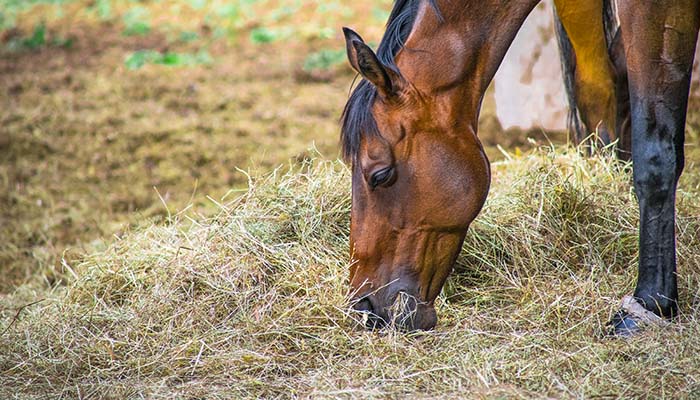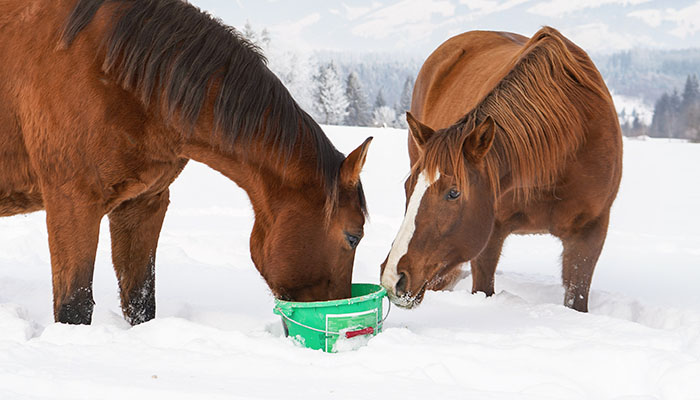
High quality forage is the cornerstone of every horse’s diet. Many horses receive their forage requirements from pasture during the summer and fall, and hay during the winter and spring. However, another forage product has become increasingly popular among horse owners. In this blog, we outline some of the benefits of feeding chopped forage to your horse.
The Chopped Hay Difference
Chopped forage is quality hay and forage that has been high-temperature dried and cut into smaller, more manageable lengths. This process locks in the nutrients of pasture while making it easy for horses to chew and digest. The length of the hay is cut to 2-3 inches, making it an optimal length for digestion. Unlike hay cubes and hay pellets, your horse is still forced to chew the hay well, which promotes saliva production and improves the digestive process.
The dehydration of the hay also eliminates mold spores, which benefits horses with respiratory ailments or compromised immune systems. Some blends are mixed with soybean oil or molasses, which not only enhances the flavor and calorie content, but also makes the hay virtually dust-free.
Just like traditional hay, chopped hay is available with a wide range of grasses and legumes. We carry chopped forage blends that contain timothy hay, orchard grass, oat hay, and alfalfa hay. Because these blends are created during the manufacturing process, you can be confident that you know exactly what you are feeding your horse. Both Triple Crown and Lucerne Forage Products produce consistent products that do not vary from bag to bag or from batch to batch. Their guaranteed bag analysis ensures that you are feeding your horses exactly what they need once you have selected a chopped forage formulation that is right for them.
Chopped forage also has a long shelf life due to the dehydration process during production. Combined with the fact that it is packaged in heavy-duty plastic bags, these forage products are extremely easy to store and are virtually mess-free.
Chopped Forage Candidates
Because of the wide range of blends of high quality forage available on the market, they are appropriate for horses of every age, breed, and workload. According to Hannah Dustin James, a Sales and Marketing Associate at Lucerne Farms, “By chopping and dehydrating our hays, we allow animals all over the country to eat more naturally regardless of their allergies, age, and medical condition.”
Senior horses are prime candidates for chopped forage. The shorter forage lengths make it easier for them to chew, especially as their teeth begin to hook or degrade so they do not wad or quid their forage rations. The short stem forage is also more digestible, allowing them to meet their nutritional requirements and continue to thrive through their golden years. Consider feeding your senior a blend with balanced proteins and increased calcium such as Lucerne Farms Hi-Fiber.
Pregnant and lactating broodmares have increased nutritional requirements as they support their own body condition as well as the nutrients for the growing foal. Many breeding programs choose to supplement their broodmares’ diets with quality alfalfa hay, chopped alfalfa products, such as Lucerne Farms Supreme Alfalfa and Triple Crown Premium Alfalfa Forage Blend, give them that nutritional boost.
Hard working performance horses require increased calories and additional protein to support muscle growth and endurance. Integrating Triple Crown Alfa-Lox Forage or Lucerne Farms Timothy Plus Alfalfa into your horse’s diet provides them with the energy and strength that they need to perform at the highest levels. Chopped forage is also extremely easy to travel with, making it popular among equestrians who are frequently trailering to horse shows and competitions.
While forage is the cornerstone of every horse’s diet, it can be difficult to provide horses with respiratory ailments the hay that they need. Hay is generally a bit dusty, which may cause flare-ups for horses with chronic obstructive pulmonary disease (COPD), heaves, or recurrent airway obstruction. In the past, soaking your horse’s hay was the only option for management, but this can be difficult to coordinate, especially during the cold winter months. Chopped forage products that are coated with low levels of molasses, such as Lucerne Totally Timothy, or small amounts of soybean oil, like the Lucerne Hi-Fiber Gold, are virtually dust-free and can be fed to your horse directly from the bag. The high-temperature drying also eliminates mold spores which can be hazardous to your horse’s respiratory health.

Horses with metabolic disorders like insulin resistance (IR) and Cushings need a diet that is consistently low in sugar and starch, also referred to as Non-Structural Carbohydrates (NSC). Many horse owners who are managing IR or Cushings horses soak their hay to leech sugars from the forage, but this is not only cumbersome but also gives inconsistent results across different cuttings of hay. Chopped forage manufacturers have developed low-NSC blends, including Triple Crown Safe Starch Forage and Lucerne Hi-Fiber Gold, that can provide your horse with complete nutrition. These products can be fed to your metabolic horse with confidence because they carry consistent NSC levels from bale to bale.
Horses prone to ulcers often need a forage-based diet to promote healing and prevent ulcers from recurring. Many studies have shown that alfalfa has a buffering effect on the sensitive stomach and hindgut tissues, especially when fed in conjunction with grain products that are more difficult for your horse to digest. By integrating Lucerne Farms Supreme Alfalfa or Triple Crown Alfa-Lox Forage into your horse’s feeding program, you can lessen the likelihood of gastric or colonic ulcers.
If you are currently experiencing a hay shortage or are struggling with poor pastures, this is a great time to introduce chopped forage into your horse’s diet. These products give you consistent access to quality hay that you can purchase on an as needed basis to fill in the holes of your feeding program. To supplement poor quality hay and pastures, we often recommend Triple Crown Grass Forage or Lucerne Hi-Fiber Gold.
How to Feed Chopped Forage

The way you feed your forage will depend on your reasons for serving it to your horse. When using as a supplement to their grain, simply mix your horse’s portion into their grain bucket. This will prevent them from bolting their grain and will force them to chew more slowly for increased digestion. Because of the way that horses chew chopped forage and the way that horses chew grain, many performance horses who are routinely fed large meals of grain and supplements have been shown to drastically benefit from being fed this way; some barns are even able to cut down on the total amount of grain that they feed.
If you are feeding chopped forage in conjunction with traditional hay, consider designating an additional grain bucket that is filled with your forage product at each feeding. This approach as a fiber compliment adds quality forage to your horse’s diet; many senior horses benefit from this approach.
Other horses, such as those with Insulin Resistance or severe respiratory ailments, may require a diet of just chopped forage. If this is the case, we recommend using a large feed tub reserved for this purpose, preferably one with adequate sides which would prevent your horse from spilling.
No matter how you choose to feed chopped forage to your horses, ponies, miniature horses, donkeys, mules, and even goats, it can be an asset to their diet. Help your equine companions thrive by introducing them to chopped forage products. Our highly-trained and experienced sales staff is always available to answer all of your questions regarding the chopped forage products that we carry and assist you in choosing the best forage product for your horse. We invite you to contact us today to set up a complementary equine nutrition consultation so we can ensure that your horse is receiving all of his dietary requirements.

I bought a bag of chopped alfalfa from another company and it is horribly dusty. If I soak it in water my horse does not like it. I bought a bag of the TC low starch chopped hay before I tried the alfalfa and it is very nice with no dust, but my horse is not crazy about it. He will eat a little at night(he’s on pasture 24/7). So i’m wondering if I get chopped alfalfa from you if my horse might like it better because it has more of an alfalfa base and a little mollases in it.
Hi Jane, the chopped alfalfa products that we carry are treated with either soybean oil or molasses, this makes them virtually dust-free. Every horse has different preferences, but many horses find the Lucerne Forage products and the Triple Crown Chopped Forage to be extremely palatable. The molasses makes it enticing to most horses!
where can i purchase triple crown chopped forage or starting my mare on this she was just diagnosed with heave’s.
Hi Debbie, Triple Crown Balancer Supplement Pellet is available for in-store pickup on our website: https://www.cheshirehorse.com/p/triple-crown-balancer-supplement-pellet—50-lb/TC30.html.